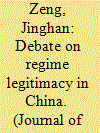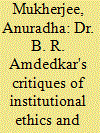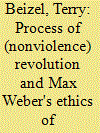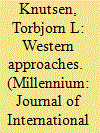|
|
|
Sort Order |
|
|
|
Items / Page
|
|
|
|
|
|
|
| Srl | Item |
| 1 |
ID:
131639


|
|
|
|
|
| Publication |
2014.
|
| Summary/Abstract |
This article identifies continuities, new trends and shifts in emphasis in the Chinese elite debate about political legitimacy by analysing 125 Chinese articles concerning legitimacy published between 2008 and 2012. It reveals a remarkable cleavage between the international perceptions of the Chinese state and the pessimistic views among Chinese intellectuals about the party's ruling. It finds that Chinese scholars often look at Western theories when dealing with the legitimacy conundrum, and rarely look at Chinese philosophy. They focus on ideology much more than Western scholars, and they are more pessimistic about performance legitimacy than the latter. Moreover, this study finds that the legitimacy concerns and policy suggestions of scholars vary significantly depending upon their research locations, institutions and funding sources. This study also finds a distinct rising appeal of social autonomy that runs counter to the dominant official line. Nowadays, value changes, socioeconomic inequality and corruption are considered to be the most perceived threats to legitimacy; ideology, social justice and governance are the leading prescriptions for the party-state. This result is vastly different from the previous study, suggesting a fundamental shift in the legitimacy debate driven by the worsening socioeconomic problems in China.
|
|
|
|
|
|
|
|
|
|
|
|
|
|
|
|
| 2 |
ID:
130808


|
|
|
|
|
| Publication |
2014.
|
| Summary/Abstract |
Ethics and morality are the milestones of civilization in the true sense of the term. These concepts again are not static but evolve with greater implications and subtler nuances as humanity strives to grow towards perfection- the ultimate end of existence. ' whether biologically or spiritually. In the context of Indian thought, the traditional, age-old dictums of ethics and morality. having undergone numerous interpretations and changes have experienced a new set of values,' however latent in the traditional interpretation of Dharma or Niri- with the advent of" nationalism, the emergence of a new nation-state and the concurrent vision of human rights. The Constitution of India fully recognizes the moral as at par with the modem, that is, the western ideals of morality in the realization that in the context of Dalit uprising in modern India, the traditional ideals of ethics and morality are to be reviewed. Obviously this shows that what is legal should be ethical and moral or rather. what is ethical and moral tnust have its place in law. It is from this perspective that the modern-day Dalit struggle against injustices, age-old as they are. are to be seen and Dr.B.R. Ambedkar's initiation to this struggle was aimed at bringing ethics and morality to work at the state level, subjugating the Nili forest while lawgivers to take a backseat before the universal laws of morality. To understand Ambedkar's stand on the place of ethics and morality in Hinduism, one must see the reasons that made him strike out at the roots of Hindu social ethics. The Hindu social life was traditionally ruled by Dilemma. Dharma guided a Hindu's'Iife from birth to death by a set of rules strictly laid out for everyone in society. The observation of these rules was morality and the underlying ethics of these duties and rights was ?rst ofall, societal good, i.e., good for 'all. The second part of this ethics was that by observing this social morality, an individual will attain perfection. In accordance with these concepts, the Dharmas/zastras dictate the functions ofthe state and the king. The Nili and Dandanili emanate from one source and with one ideal- that is to maintain the social order by arranging for the speci?c duties of each and every member of society. Consequently. rights came as group rights and institutional rights as laid out in the Dharamshastra'. And over and above everything was the belief in the law of Karma that sanctified the rule of l/Z7I'l7aS/1I'uII7(l, or ones station in life as prescribed by onc's birth. These two essential features of Hindu society made it a highly stratified one so that the passage of' centuries only tightened the rules and the rituals pertaining to these two rules. The solemn and noble hymns of Rigveda. where the philosophy of Vedic seers and poets as the world being one and where everyone was the other's kin. I Va.t'zzdlmibu Kzzrumba/(um )' is the spirit of the ancient Indian Vedic realization. The utmost ideals of human dignity with the universal ethics of righteous behavior and the universal morality of conscientious behavior were preached in their fullest glory. . '
|
|
|
|
|
|
|
|
|
|
|
|
|
|
|
|
| 3 |
ID:
131015


|
|
|
|
|
| Publication |
2014.
|
| Summary/Abstract |
Weber dismissed paci?sm as an inadequate orientation to modern social and political life. However, the ethical and methodological imperative of Gandhi's insistence on active nonviolence contention is illuminated by and consistent with Max Weber's "ethic of responsibility"-marked by both passion and proportion-in the relationship between motivations, means, and ends in social action. Therefore, Weber's insights add clarity Gandhi's nonviolent ethics and methods; Gandhi's nonviolent ethics and methods add clarity to Weber's understanding of responsibility in modern political and social life. This provides a key to understanding active nonviolence and building the (peaceful) future in the process of revolution.
|
|
|
|
|
|
|
|
|
|
|
|
|
|
|
|
| 4 |
ID:
133554


|
|
|
|
|
| Publication |
2014.
|
| Summary/Abstract |
The Eurocentric Conception of World Politics is a fabulous but depressing genealogy of the modern study of International Relations (IR). The book is impressively comprehensive in content, It is complex in design. It exposes the self-serving dogmatism which have always marked mainstream IR literature. While admiring the scholarly qualities of the book, this review wonders if its critical exposure is excessive? Is there any scholarly approach in IR which is not crippled by its comprehensive condemnation? Does this book, which is written in the European tradition of Critical Theory, ultimately become a victim of its own sweeping criticism of the Western canon?
|
|
|
|
|
|
|
|
|
|
|
|
|
|
|
|
|
|
|
|
|